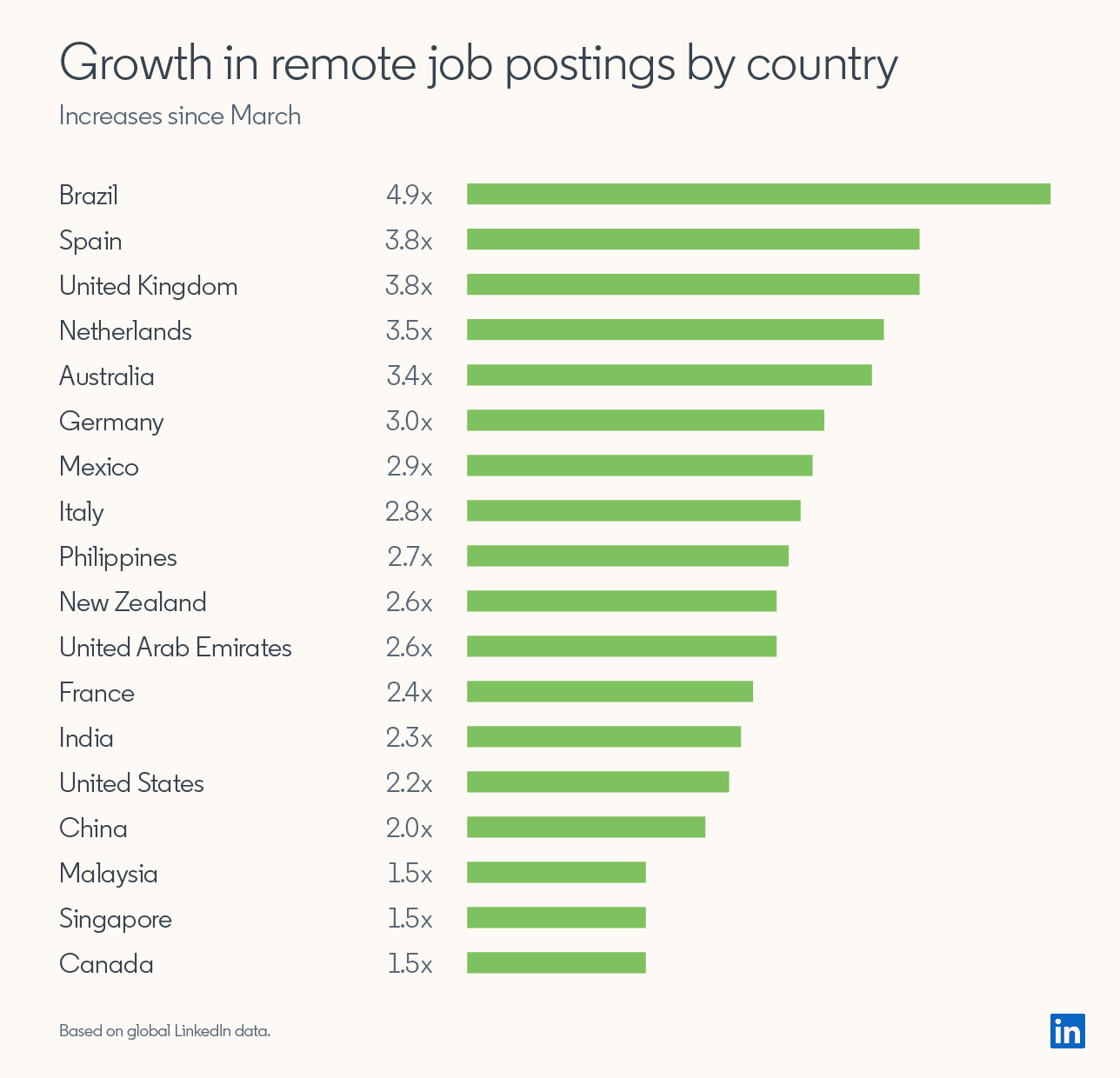Your complete guide to successful remote recruiting

In a world characterized by the rise of technology, the ever-growing need to streamline business processes, and the unknown (think the current COVID pandemic), remote recruiting has emerged as the perfect answer.
What is remote recruiting?
Remote recruiting refers to the process of sourcing and identifying potential employees, interviewing them via technology, and hiring them, all while they are located in a totally different place.
In essence, it makes it possible for the entire hiring process to be conducted via the Internet without the need for the recruiters and the candidates to meet in person. According to this study by Mercer, it has proven to be an absolute panacea.
Judging from the 2020 spike in remote work worldwide, it only makes sense to provide a guide laden with tips for successful remote recruiting.

Image Source: LinkedIn
Tips for successful remote recruiting
1. Optimizing the job ad is the first step
The journey towards successful remote recruiting begins with an optimized job ad.
Of all tips, the first in this walkthrough to successful remote recruiting is for the recruiter to create an effective job ad without falling into certain ditches. Since candidates deserve to know what to expect, the ad should sufficiently describe the job while itemising the roles and expectations that come with the position.
Additionally, the ad should give the candidates an idea of the following:
- The company’s culture
- Whether the company is remote-friendly or otherwise
- Compensation and other benefits of working for the company
- Working hours, etc
Some other nifty moves include leveraging the power of Search Engine Optimisation and utilizing keywords throughout the ad. The keywords should include the various titles of the job position, as well as the city where there is a vacancy.
Also, a video-based ad is thoroughly engaging as it fosters a greater personal connection with the candidates. Actually, research shows that video-based job ads are viewed and applied for significantly more than ordinary ads.
2. Implement structured hiring
A structured hiring approach is one of the surefire tips for successful remote recruiting.
Structured hiring kicks off from when a role is initially conceived and ends when a hiring decision is finally made. Essentially, it involves defining the ideal candidate using the role’s business goals, assessing all candidates using a consistent and calculated process, and finally making hiring decisions based strictly on data and pure evidence.
Some benefits of a structured hiring process include:
- Reduced risk of biases
- Shorter and consistent interviews
- Easy identification of ideal candidates
- Easy tracking of the hiring process
A conversation about a hiring process is never complete without the mention of Applicant Tracking Systems - a centralized software that helps keep the remote hiring process in line. It is prudent to utilize ATS during hiring. If you are nursing thoughts on how to choose the perfect applicant tracking system, we’ve got you covered!
3. A shortlisting process is necessary
Do you know that proper candidate-matching has proven to be one of the most challenging parts of recruitment?
Shortlisting is the process of identifying the candidates from the pool of applicants who are ideal for the job vacancy, and who you’d want to proceed to the subsequent stage of recruiting with.
When creating a shortlisting process, balance is the name of the game. As you determine the criteria upon which you’ll score your candidates, be sure that the standards are high enough to guarantee that you get the ideal picks, but not unreasonably high that you lose out on noteworthy applicants.
Your criteria ought to be based on what best satisfies the demands of that particular role, and should be applied fairly and consistently across the pool of applicants. It is imperative that your criteria are not discriminatory. Else, you might find yourself on the wrong end of a discrimination lawsuit.
4. Do your candidates have the required gear?
As thankful as we are for the ability to work from every nook of the world, there are some necessary requirements, viz: a reliable internet connection, a computer with the necessary hardware and software.
Ascertain that your candidates have the required equipment. That’s another notable step towards successful remote recruiting.
You should find out if the candidate’s workstation is up to par for the work to come with the role they are about to fill. You could easily find this out by asking them directly or using a system diagnostics tool. Even better, put their mind at ease by letting them know what equipment you will provide them.
5. Create a thorough question set
With remote recruiting comes the special need to get an idea of how your candidate handles work remotely. Therefore, your questions should embrace both the regular interview questions that indicate knowledge of the field and questions that test their capacity when they are working outside the confines of the office.
Your questions should touch on matters concerning working autonomously, resourcefulness, daily routine, personal drive and development, time management, focus, discipline, and time management.
6. Make the most of video interviewing
Thanks to its innumerable benefits, video interviewing is largely considered the heart and spine of remote recruiting, and is, therefore, crucial to its success.
It is noteworthy that the interview process could be made up of different stages. Consequently, the recruiter should apply a working video interviewing strategy to figure out what kind of video interview suits each stage of the interviewing process.
A one-way video interview is suitable for pre-recorded questions which the candidates can answer and submit, while a live video interview is necessary for a flowing conversation and to observe the candidate’s body language. Both are crucial and should not be neglected.
As an interviewer, ensure that your Internet connection is stable. Also, put a backup plan in place in case anything falls through the cracks.
If you are wondering what video interviewing software is best for your remote recruiting needs, look no further. Shine has everything you need and more!
7. Prioritize collaborative hiring
Not being on the same page with your hiring team is an absolute disaster, particularly in the event of remote recruitment. The chances of good remote recruiting are slim if the members of the hiring team are not aware of who should be doing what and when.
Some benefits of proper alignment of the hiring team include:
- It reduces the risk of unfit hires
- Collaborative hiring fosters teamwork and boosts the possibility of the new hire fitting in with the rest of the team
- With collaborative hiring, there is a heightened sense of responsibility amongst the hiring team to assist the “new guy”. Consequently, the onboarding process becomes a breeze!
We’ve got some examples on how to make the hiring process more collaborative.
8. Incorporate an examination phase
Another tip that ensures thriving remote recruiting is an assessment stage. Though the candidates are in the comfort of their homes, it is not out of place to give them a work sample test to get a tangible idea of their practical skills.
It is strongly recommended that you allocate a specific time to the task to find out their working ability under pressure. Work tests have proven to be one of the top indicators of job performance because they are highly valid and reliable assessments of the candidates’ skills and knowledge.
9. Don’t leave your candidates in the dark
Of all the tips for successful remote recruiting, the most subtle yet highly effective is the practice of keeping your candidates in the loop. Constantly fill them in on the status of their application and how the recruitment journey is going.
In the event of any issue, such as COVID or a political crisis that might affect your business operations, notify them of what steps your company is taking to stay safe or help the situation.
Building the relationship during the recruitment stage makes your brand desirable.
10. Respect data privacy
Lastly, your remote recruiting is not really successful if it lands you in contentious legal waters.
In this day and age, data is life; candidates are concerned about how their personal data are being used.
Regulations play a huge protective role in determining the fate of personal data of candidates. Make sure you are up to date with relevant legislation to understand how to handle such delicate information. If in doubt, seek expert advice.
For businesses in the UK, till date, regardless of the Brexit deal, the GDPR checklist still holds sway, so we’ve provided insight on its implication for recruiters.
There you have it; a comprehensive manual on how to succeed at remote recruiting. Put these tips to work and watch your recruiting soar!
